Al-Sayyid al-Sheikh
Muhammad Abul Yusr `Abidin al-Husayni
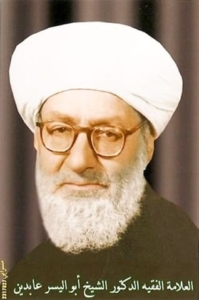
Mufti of Syria, and one was one of the greatest scholars of the 14th century H. He combined mundane and sublime knowlege, practicing the profession of medicine while teaching Islamic sciences in his home, in mosques, and in the University, and resolving the most intricate legal issues of his day. He expended himself and his wealth in jiha, never flinching from the support of the Shari’a. He lived a frugal life, devoted to the service of the Muslims and the love för learning and teaching, and died embraced by visions of the saints
Watch Shaykh al-Yaqoubi – Mufti Abul Yusr ‘Abidin” on YouTube
In 1958, the Arab Union, formed between Egypt and Syria, wanted to nationalize private wealth, an act that is against the Shari`a. Sheykh Abul Yusr was asked to give a fatwa in support of the project, but refused. He was then ousted from the position of Mufti by pressure from the Egyptian president Jamal Abul Nasir. The union lasted only three year, after which the office of Mufti of the Republic was again entrusted to Sheikh Abul Yusr.
[2] He did not nominate himself for fatwa position. A Sheikh is not supposed to apply for a position, rather he should view himself as undeserving –unless if an unqualified person is appointed. In such a case, he should announce himself. (nfact it then becomes obligatory for him to offer himself for the post.
Sheikh Abul Yusr was a phenomenon that very few people in a century could match. At the age of 15 he was already a mature person, acting as an Imam and giving lectures in Fridays – and as such following the example of the young comapnions of the Prophet (sallAllah `alehi wa sallam), like Usama b. Zayd, commander of the expidition ot Tabuk at age 16; `Ata, the governor of Makka at age 18; and Sayyidatuna `Aisha, the wife of the Prophet (sallaAllah `aleihi wa sallam) at age 9.
He mastered several languages. Born in 1889, at the end of the Ottoman rule, he studied Turkish and Persian (memorizing many thousand verse lines in Persian). Later, during the french occupation of Syria in 1920, he learned french.
When Arab nationalists, supported by the Brittish, revolted againt the Turks in 1915. the Syrian `ulema sided with the Ottoman caliphate. They also condemned the uprising of the Ashraf of Makka against the Ottomans in 1916, when King Faysal, son of Husayn (the Sharif if Makka) ousted them form Hijaz and declared himself “King of the Arab Countries”. His Kingdom was to last for four years. In 1918, he gained power over Syria. The collaps of the Calilhate marked the beginning of the decay of fiqh and the excercise of Shari’a. When, in 1920, Faysal was declared King of Syria, Sheikh Abul Yusr was the one who handed over the command to him, and adviced him to base the Law (Dustur al-Balad) upon the Shari’a, saying: “This is an amana that you have taken off my neck and placed on your onw neck. Know that you kingdom will end if you do not judge according to the Shari’a, and the West will laugh at you, as they are laughing at your brother.” {referring to `ÀbdAllah b. Husayn, whom the Brittish regognized as the King of Jordania} Upon this, the King left him without giving salam.
He visited many coutnries, and performed hajj several times.
He combined studies under the Shuyukh with studies in the govermental institutes, until he entered the faculty of Medicine of the Syrian University, called Center of Medicine (Ma`had al-Tibb), from which he graduated in 1345 H. (1926) at the age of 38. He acquired a certificate in practical medince, and a French certificate in surgery.
At that time he was appointed to succeed Sheikh Amin al-Suwayd in teaching Islamic Shari’i subjects in the faculty of Law. hence he was at one at the same teacher in one institute and student in another.
He was one of the founders of the Shari’a Faculty at the University of Damascus, which was opened in 1375 H. / 1955, and its principal, and he was he was appointed to teach grammer, sarf and usul there.
He descends from a family of scholars and nobles, whose lineage goes back to Sayyiduna al-Husayn, the grandson of the In 1958, the Arab Union, formed between Egypt and Syria, wanted to nationalize private wealth, an act that is against the Shari`a. Sheykh Abul Yusr was asked to give a fatwa in support of the project, but refused. He was then ousted from the position of Mufti by pressure from the Egyptian president Jamal Abul Nasir. The union lasted only three year, after which the office of Mufti of the Republic was again entrusted to Sheikh Abul Yusr.Prophet (sallAllah `aleihi wa sallam), who came to settle in Damascus in the 4th century H. The most famous member of the family is probably Sheikh Muhammad Amin b. Umar `Abidin (d. 1252 H.), the author of the famous Hashia, which is considered as “the last word” and final authority of Hanafi madhhab. In the Indian subcontinent he is known as `Abidin al-Shami.
His lineage is:
Muhammad Abul Yusr `Abidin,
b. Muhammad Abul Khayr {d. 1345 H.}
b. Ahmad (d. 1307 H.)
b. `Abd al-Ghani (brother of Muhammad Amin `Abidin, sahib al-Hashia)
b. `Umar
… (see family tree) …
b. Isma’il al-A`raj
b. al-Imam ja`far al-Sadiq
b. al-Imam Muhammad al-Baqir
b. al-Imam `Ali Zayn al-`Abidin
b. al-Imam al-Husayn
b. Sayyidina `Ali & Sayyidatina Fatima radia Allah `anhum.
His reliation to Sheikh Muhammad Amin `Abidin, author of the Hashia, known as Ibn `Abidin:
He was born in Damascus in Hayy Suqsaruja. His first teacher was his father, the Mufti of Sham Sheikh Muhammad Abu Khayr (d. 1345 H.), From him he learned the Quran in the Hafs-`Asimi qira’a, grammar, mathmatics. logic and fiqh. His father gave him ijaza of everything acquired by reasoning and transmission from his father, Sheikh Ahmad [1], and from the latter’s cousin Sheikh `Ala al-Din. His father taught him to honor people and instilled in him the love for books and learning.
He later studied religious´sceíences under the greatest scholars of his time, such as:
– Sheikh Salim Samära
– Sheikh Amin Suwayd
– al-Muhaddith al-Akbar Sheikh Badr al-Din al-Hasani,
all of which gave him ijaza verbally and in writing
He had ijaza for tasawwuf and tariqa from his grandfather Sheikh Ahmad, who in turn had done his suluk under Ibn `Abidn (the author of al-Hashia), who took it from his Shekh, Mawlana Khalid al-Naqshbandi (d. 1242 H.), who in turn took it from Sheikh al-Dihlawi.
From his grandfather Ahmad he also had ijaza in the Khalwati tariqa, which he had from Sheikh al-Mahdi al-Saklawi al-Jaza’iri, who migrated to Syria and passed away there in 1263 H.
[11: Sheikh Amad passed away the same year as Abul Yusr was born. His father, well aware of the value of ijaza, took him to his grandfather as a baby, and he was given ijaza, to become effective when he reached the age of maturity. The actual training he received from his father.]
His skills and work.
He mastered several languages. Born in 1889, at the end of the Ottoman rule, he studied Turkish and Persian (memorizing many thousand verse lines in Persian). Later, during the french occupation of Syria in 1920, he learned french.
He visited many coutnries, and performed hajj several times.
He combined studies under the Shuyukh with studies in the govermental institutes, until he entered the faculty of Medicine of the Syrian University, called Center of Medicine (Ma`had al-Tibb), from which he graduated in 1345 H. (1926) at the age of 38. He acquired a certificate in practical medince, and a French certificate in surgery.
At that time he was appointed to succeed Sheikh Amin al-Suwayd in teaching Islamic Shari’i subjects in the faculty of Law. hence he was at one at the same teacher in one institute and student in another.
He was one of the founders of the Shari’a Faculty at the University of Damascus, which was opened in 1375 H. / 1955, and its principal, and he was he was appointed to teach grammer, sarf and usul there.
.
[2] He did not nominate himself for fatwa position. A Sheikh is not supposed to apply for a position, rather he should view himself as undeserving –unless if an unqualified person is appointed. In such a case, he should announce himself. (nfact it then becomes obligatory for him to offer himself for the post.
top >>
The “Leage of `Ulema of Syria” (Rabita Ulama’ Suriya) [3] acted to establish a united front against the Brittish and French colonizers and their helpers. When “the great calamity” occurred in 1948 (with the formation of the state of Israel), the `ulema set up a councel to encourage people to jihad, and established training camps, with the aim of liberating Palestine. Sheikh Abul Yusr was amongst those who trained themselves in arms and shooting. He proved himself a great fighter, encourging others to follow his example.
[3] The Leage of `Ulema was founded and led by Sheikh Muhammad al-Makki al-Kettani at the end of the second world war.
His personality and way of life
He was of medium hight, fairskinned, with an awe-inspring beard. He used to cover his head with a white turban. and to wear wear Qiba’ and Jubba. When he was working in the Fatwa office, he would wear trousers under a long overcoat.
His life pace was intense, his life revolving around his clinic, his home and his halaqas, giving equal attention to the needs of his own family, his patients, his students, and public issues. He presided the society of Khayr of his neighbourhood, taking care of people’s needs and helping the poor ones and the widows among them. He was devoted to worship of Allah, and managed with little of this world. His food was light, and many a time he would perform fajr salat with the wudu of `isha.
He practiced medicne for thirty years, treadting both body and heart. Although qualified in both the naqshbandi and Khalwati paths, he did not have murids. Like many scholars of the past, he disliked forming groups around him, nor did he give public talks. His speech was brief – a few words would be sufficient to enter people’s hearts.
His students where scholars in their own right. While his father was still alive – and with his permission – he assumed the office of Imam and Friday speaker and teacher in the Barsabay mosque, known as Jami`al-Ward, to which his home in Suqsaruja was attached, and he remained there until sickness forced him to quit. He paid attention ot books of salaf and the traditional principles of the sciences. He had a halaqa in his home, which was never interrupted until his last illness, where he used to go over and comment books according to the method of the salaf, verifying them in scholarly manner. His house was always full of young men for almost eighty years. He taught the Hashia of Ibn `Abidin and his epistles, the book al-Hadiyya al-`Ala’iyya, the tafsir of Ibn Kathir, Sahih al-Bukhari and its commentary Fath al-Bari, Sahih Muslims and its commentary by Imam al-Nawawi, Jami`al-usul etc. His special students would come to him regularly for profound study of delicate matters. This in addition to the many circles of study he conducted in the various mosques of Damascus.
His knowledge was firm and profound, and his way was that of deliberation, prudence, and care in details. Even the greatest `ulema of time turned to him to consult his opinion, and he would spend days and nights looking up fatwas. Although, when asked, he could give an immediate answer, yet out of humblesness, he would often rather say: “I don’t know, let’s look it up.” Scholars, judges. members of parliament would come to him with their issues. and he would not stop attedning to them, even after his retirement from the Board of Fatwa – even during his last illment he was still resolving scholarly issues while very sick. If he didn’t find a certain book with him, he would encharge one of his students to go and buy it and read it.
He was an upright scholar and a deep knower of fiqh, who would keep his honor and integrity without self-interest, and without ceding for people of power, and always spoke the truth even if against great odds. He was a magnanimous soul, generous with his weath and his person. He was intelligent and quick-witted, and knew how to handle issues. His pesonality was humble, yet people reverred him and raised him in esteem. In his time, when people met scholars in public, they would step aside and kiss thier hands, yet he would not allow anyone to do that except young boys, He adhered to the way of sufis, loved the scholars and the righteous, and liked to visit both the living ones and the dead ones among them.
His books and library
He autherd some fifty books, many of wich are great references, among them:
“Aghalith al-Mu’arrikin” – Errors of historians, 350 pages, addressing made-up accounts from the `Abbaside times, concerning Mu`awiya and Yazid, and how Alh al-Bayt were treated in Damascus
“Lima summiya” – Why it was named
“Awrad al-Da’ima” – Dayly Wird
“Hakaya Sufiya” – Sufi stories
“On women” – about female scholars
A treatese on the qira’at
A book on Usul al-Fiqh (originally compiled for the university)
Kitab al-Fara’id
Kitab al-ahwal al-shakhsiyya
A cllection of poetry (diwan)
etc.
He left behind a immense library, parts of which he inherited from his father and grandfather, and to which he added. It is maybe the rarest in the Islamic world containing 3000 manuscripts, among them handwritings of Ibn Taymiyya, members of the Subki family, Ibn Hajar al-`Asqalani, Imam al-Suyuti, Imam al-Sha`rani, Imam al-Nawawi etc.
His passing
During his last days, his soul became very serene, and he had many visions of schoalrs and saints who preceded him to his Lord. In his last days, he became ill and his body beame weak, until he died on the 8th of Rajab year 1401 / 1981. The funeral prayer was held in Jami`al-Ward on the same day, and he was buried in teh graveyard of Bab Saghir in his father’s grave, close to the grave of Sheikh Abd al-Karim al-Afghani and Sheikh `Ala al-Din al-Haskafi and Sheikh Muhammad `Abidin and Sheikh `Ala al-Din `Abidin.
Relation to the Yaqoubi family
Isnad:
One of the highest isnads of hadith in the world today goes through the Yaqoubis, through the `Abidins, through the Kuzbaris etc down to Ibn Hajar al-`Asqalani, as follows:
Sheikh Muhammad al-Yaqoubi
from Sheikh Abul Yusr `Abidin (d. 1401)
from Sheikh Ahmad `Abidin (d. 1307)
from Sheikh `Abd al-Rahman al-Kuzbari (d. 1262)
from Imam Mustafa al-Rahmati al-Ayyubi al-Ansari al-Hanafi (d. 1205)
from Imam `Abd al-Ghani al-Nablusi al-Hanafi (d. 1143)
from Imam Najm al-Din Muhammad ibn Muhammad al-Ghazzi al-Diamshqi
from his father al-Hafiz Badr al-Din Muhammad ibn Muhammad al-Ghazzi
from Shekh al-Islam al-Qadi Zakariyya al-Ansari
from Amir al-Mu’minin Imam Ahmad ibn `Ali known as Ibn Hajar al-`Asqalani al-Shafi`I (d. 852)
Tariqa:
The Khalwati tariqa was revived in Damascus by Sheikh al-Mahdi al-Saklawi al-Jaza’iri (d. 1278). Among his murids where the greatest scholars of Damascus, such as
his son-in-law Sheikh Siddiq al-Yaqoubi (d. 1307), and his son Sheikh Sharif al-Yaqoubi (d. 1362)
his son-in-law Sheikh Muhammad al-Mubarak (the elder), and his son Sheikh Muhammad al-Tayyib (d. 1313)
Sheikh Abu Nasr al-Khatib al-Shami (who was older that sheikh al-Saklawi)
Sheikh Ahmad `Abidin (d. 1306), grandfather of Sheikh Abul Yusr `Abidin
Sheikh Abul Yusr was 30 years older that Sheikh Ibrahim, and passed away a few years before him. He ranked Sheikh Ibrahnim al-Yaqoubi as the top scholar if Usul al-Fiqh in Damascus, and said: “Sheikh Ibrahim is the authority if you don’t find me”
Sheikh Muhammad al-Yaqoubi was 18 years of age when Sheikh Abu Yusr passed away, He sat with his special students in the halaqa in his home, and he saw his library. He was given verbal ijaza by Sheikh Abul Yusr.
At the funeral of Sheikh Abul Yusr, Sheikh Muhammad al-Yaqoubi recited a poem in forty lines, written by his father Sheikh Ibrahim in
All thanks go to Damas Cultural Society for working hard and making this information available



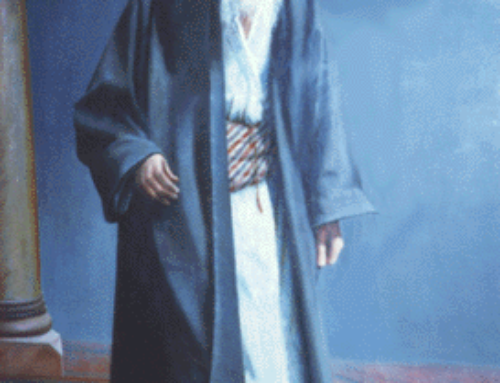
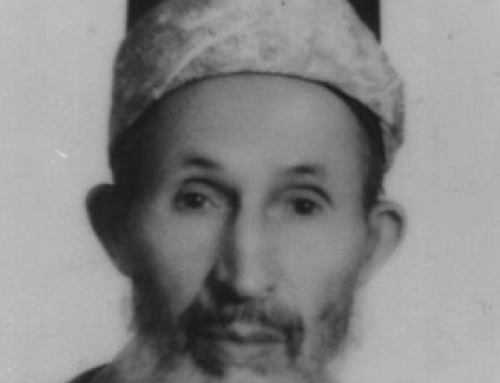
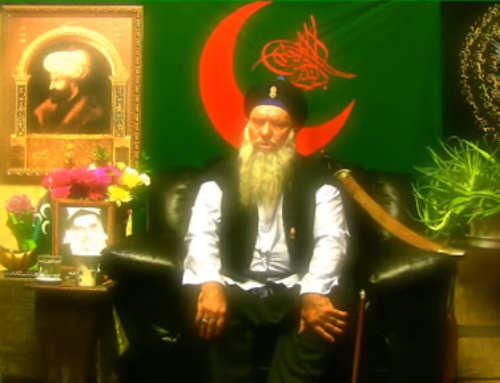
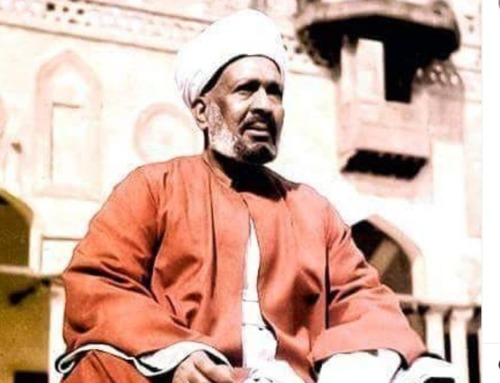
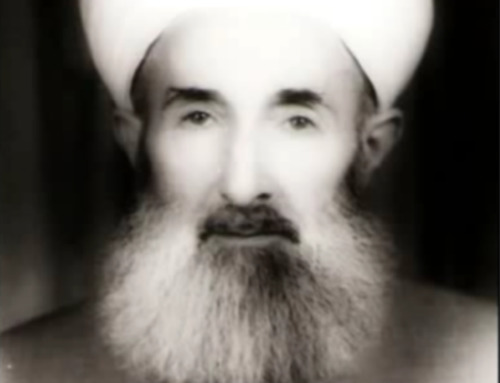
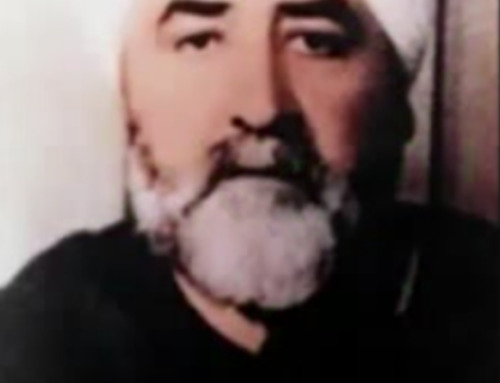
Leave A Comment